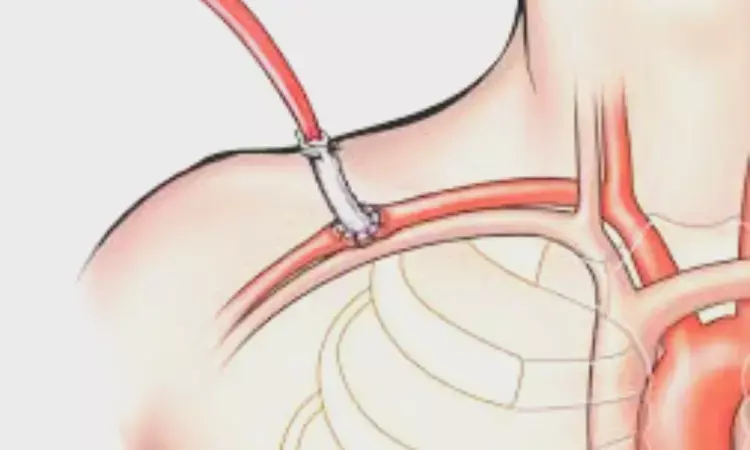- Home
- Medical news & Guidelines
- Anesthesiology
- Cardiology and CTVS
- Critical Care
- Dentistry
- Dermatology
- Diabetes and Endocrinology
- ENT
- Gastroenterology
- Medicine
- Nephrology
- Neurology
- Obstretics-Gynaecology
- Oncology
- Ophthalmology
- Orthopaedics
- Pediatrics-Neonatology
- Psychiatry
- Pulmonology
- Radiology
- Surgery
- Urology
- Laboratory Medicine
- Diet
- Nursing
- Paramedical
- Physiotherapy
- Health news
- Fact Check
- Bone Health Fact Check
- Brain Health Fact Check
- Cancer Related Fact Check
- Child Care Fact Check
- Dental and oral health fact check
- Diabetes and metabolic health fact check
- Diet and Nutrition Fact Check
- Eye and ENT Care Fact Check
- Fitness fact check
- Gut health fact check
- Heart health fact check
- Kidney health fact check
- Medical education fact check
- Men's health fact check
- Respiratory fact check
- Skin and hair care fact check
- Vaccine and Immunization fact check
- Women's health fact check
- AYUSH
- State News
- Andaman and Nicobar Islands
- Andhra Pradesh
- Arunachal Pradesh
- Assam
- Bihar
- Chandigarh
- Chattisgarh
- Dadra and Nagar Haveli
- Daman and Diu
- Delhi
- Goa
- Gujarat
- Haryana
- Himachal Pradesh
- Jammu & Kashmir
- Jharkhand
- Karnataka
- Kerala
- Ladakh
- Lakshadweep
- Madhya Pradesh
- Maharashtra
- Manipur
- Meghalaya
- Mizoram
- Nagaland
- Odisha
- Puducherry
- Punjab
- Rajasthan
- Sikkim
- Tamil Nadu
- Telangana
- Tripura
- Uttar Pradesh
- Uttrakhand
- West Bengal
- Medical Education
- Industry
Patients with type A aortic dissection have 3-fold higher risk of stroke in long-term: JAHA

Taiwan: Type A aortic dissection (TAAD) patients versus aortic disease-free individuals are at increased long-term risk of stroke, both hemorrhagic and ischemic, research published in the Journal of the American Heart Association has stated.
Type A aortic dissection (TAAD) patients were associated with a >3‐fold higher stroke risk than those without aortic disease for a mean follow-up period of ≈5.71 years. According to the study authors, this is the first cohort study examining the association between TAAD and long-term stroke risk. "The trend of increased stroke risk was consistent across subgroups stratified by sex; age, antiplatelet use; and history of hypertension, dyslipidemia, or diabetes," they wrote in their study.
Type A aortic dissection among the most life‐threatening cardiovascular diseases (CVDs). In recent years, with advances in surgical repair techniques, the 3-year survival rate of TAAD patients has increased to 90.5%. However, they are shown to be a high short‐term risk of stroke but whether TAAD patients are at increased long‐term stroke risk remains unknown. To address this knowledge gap, Jin‐Yi Hsu, Tzu Chi University, Hualien, Taiwan, and colleagues aimed to examine whether TAAD patients have an increased long‐term risk of stroke on the basis of nationwide longitudinal data in Taiwan.
For this purpose, the researchers conducted a nationwide retrospective cohort study using Taiwan's National Health Insurance Research Database. They performed inverse probability of treatment weighting to balance patient characteristics between the groups. The Cox proportional hazards model, was used to determine the hazard ratios (HRs). The study's primary outcome was the development of stroke, irrespective of subtype.
The study demonstrated the following findings:
- 3556 and 7023 patients were grouped into the TAAD and aortic disease–free cohorts, respectively, after the inverse probability of treatment weighting. These patients were followed for a mean period of 5.71 years.
- Compared with the aortic disease-free cohort, the HRs for overall, hemorrhagic , and ischemic strokes in the TAAD cohort were 3.01, 2.32, and 3.18 respectively.
- Analyses stratified by age; sex; antiplatelet use; and hypertension, diabetes, or dyslipidemia history revealed consistent trends of higher stroke risk in TAAD patients.
"Our results showed that TAAD patients are at increased long-term risk of strokes, both hemorrhagic and ischemic," the authors concluded. "Further research is warranted to develop optimal strategies for stroke prevention in these patients."
The findings provide physicians with more evidence for the requirement for intensive follow‐up and control of aggressive risk factors for modifiable stroke risk factors in Type A aortic dissection (TAAD) patients.
Reference:
Hsu JY, Liu PP, Liu AB, Huang HK, Loh CH. Long-Term Risks of Stroke in Patients With Type A Aortic Dissection: A Nationwide Cohort Study. J Am Heart Assoc. 2022 Nov 3:e027178. doi: 10.1161/JAHA.122.027178. Epub ahead of print. PMID: 36326053.
Dr Kamal Kant Kohli-MBBS, DTCD- a chest specialist with more than 30 years of practice and a flair for writing clinical articles, Dr Kamal Kant Kohli joined Medical Dialogues as a Chief Editor of Medical News. Besides writing articles, as an editor, he proofreads and verifies all the medical content published on Medical Dialogues including those coming from journals, studies,medical conferences,guidelines etc. Email: drkohli@medicaldialogues.in. Contact no. 011-43720751


